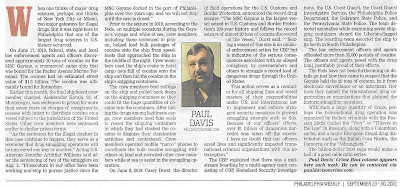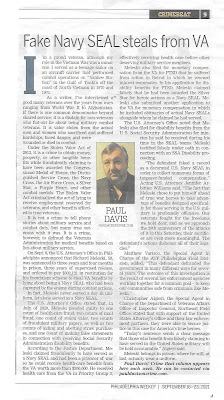The
below short story originally appeared in American Crime Magazine.
What’s
in a Nickname?
By Paul Davis
What’s in a Nickname?
By Paul Davis
I’ve always enjoyed comedians, as I love a good laugh.
I recall back in the late 1970s, when I was young, single and
happy, and along with my friend Buster Stracci, we were barhopping in South
Philadelphia on a Friday night.
With Buster’s car squeezed into a tight parking space, a rare
find on a Friday night in South Philly, we were walking around and breezing in
and out of local bars.
On the way from one bar to another, I saw a storefront that
advertised a comedy club. I suggested to Buster that we check it out. We went
in. It was a small place, with a small, elevated stage, a short bar, and about
a dozen tables and chairs crowded together.
Buster sat down and ordered drinks, as I looked for the Men’s
room.
I saw a thin, goofy looking guy with glasses and unruly hair
standing near the stage and I asked him where the men’s room was. He pointed to
the door behind him. I opened the door and saw two young girls combing their
hair. I closed the door and in anger I grabbed the goofy guy’s arm.
“What are you, a comedian?” I yelled as he cringed and looked as
if he was about to faint. “That was the Ladies’ Room!”
I heard the MC on the stage get on the mic and begin to
introduce the first act, so I forgot about the goof and about washing my hands
in the Men's room and sat down next to Buster.
To my surprise, the first act was the goofy looking guy.
Buster began to laugh loudly. He slapped me on the back and
said, “You asked him if he was a comedian – and he is!”
The goofy looking guy on stage said, “I must be a good comedian,
as I’m getting laughs before I even speak.”
He was wrong. He was not a good comedian. And that initial laugh
from Buster was the best one he received during his entire act. The next
comedian, thankfully, was much better.
Later, I discovered that the small club only had one restroom,
which both men and women used. Those two girls hadn’t locked the door while
they were in there.
Some years later, after I married my beautiful wife Dolores, we
would go to the comedy clubs, as she enjoyed the comedians as much as I
did.
On one Saturday night, Dolores and I, accompanied by Mark
Terranova and his wife Diane, visited “Nicky’s Number One.” The club was
located up the street from “Geno’s Steaks,” the famous cheesesteak place that
the tourists frequent in South Philadelphia.
Having heard that the club was featuring comedians as well as
musical acts, my friend Mark, a retired Philadelphia detective, suggested that
we take our wives there.
The club was called “Nicky’s Number One,” as it had been
Nicodemo Esposito’s first club when he first entered the nightclub business
some years back. Esposito was nicknamed “Nicky Number One,” as the story goes,
as he had been a record promoter in the 1960s when the expression “number one
with a bullet” meant a song was rising to the top of the Billboard record
charts.
The nickname also came from Esposito being a long-time soldier
in the local mob, and for a time, back in the day, he had been the number one
guy to call when the boss wanted to put a bullet in someone.
Nicknames are big in South Philly.
Either you are called the diminutive of your Christian name, as
in “Paulie” for Paul, or you are given a nickname due to a characteristic of
your physical looks or personality.
While some nicknames are complimentary, many are not flattering,
and those tagged with a moniker often do not care for it. But if the nickname
is apt and sticks, it will be how you’re known for life.
Terranova and I and our wives enjoyed the comedy act, which
featured Albert “Cheat Sheet Al” Stevens. He was a stocky guy with an oversized
head, and he had an irritating, high pitch voice. We laughed at most of his
jokes, but in my view, he was not that original or innovative a comedian.
Like Terranova and I and our wives, Al Stevens came from South
Philly. Stevens was about four or five years younger than me, so I didn’t know
him from the neighborhood. He was a small kid when I enlisted in the U.S. Navy
in 1970 when I was 17.
Terranova knew Stevens, and prior to seeing his act, he told me
the guy was hilarious when he was a kid.
His stage nickname was derived from one of his gags. When a joke
of his would bomb, he would pull out his “cheat sheet,” look at it, and then
tell the audience that he was right, and they were wrong for not laughing. He
did this gag several times during his act.
I had seen that gag before, so it was not original.
After the show, Mark Terranova took us all to the bar to meet
Stevens. He introduced us all and told Stevens that I was a columnist for the
local newspaper.
He shook my hand enthusiastically.
“Are you working tonight?” he asked with a wide grin.
“No. I write a crime column, not an entertainment one.”
He dropped my hand as the grin disappeared and he turned quickly
to Terranova, dismissing me as I wasn’t able to promote his act. I felt the
urge to smack the back of his big head.
I listened as Stevens told Terranova how he had changed his
stage name to “Cheat Sheet Al,” which helped him attract comedy gigs and fans.
He said he gone to Hollywood and made a TV pilot, called – you guessed it -
“Cheat Sheet Al.” The pilot was not picked up by the network.
“I went for the brass ring,” he told Terranova. “But I couldn't
grab it.”
Stevens said he was thankful that Nicky Esposito had offered him
a job, as he was tired of being on the road and he liked working back home in
South Philly.
Stevens hugged Terranova, nodded to our wives, and left the bar.
We grabbed our coats and headed out the door.
As we walked out the door, we stopped and shook hands with
Nicodemo Esposito, a short, grim elderly man in a suit and tie.
“Nick, you old fucking hoodlum. How are you?” Terranova asked
Esposito in good humor.
“Good, good, you rat bastard cop,” Esposito responded in
kind.
We all laughed as we left the club.
The following week I heard that Stevens had been murdered and
Esposito had been charged with the homicide. I called Terranova and asked him
if he heard anything.
Terranova called me back a few hours later and told me what the
detectives on the case were saying.
The detectives assigned to the case told Terranova that Esposito
had become increasingly deaf in his old age, so he didn’t much listen to the
acts in his club. He was also becoming increasingly paranoid, and, apparently,
he didn’t know that a cheat sheet was a small piece of paper with notes that
one used to cheat on tests, or to aid a public speaker, or, as in the case of
Al Stevens, simply a small sheet he used as a prop in his act.
The detectives discovered that after Stevens’ act, the comedian
and some friends and fans were drinking at the bar with Esposito nearby.
According to the bartender, Joe Abramo, Esposito, despite his hearing loss,
kept hearing the comedian being called “Cheat Sheet Al.”
Abramo told detectives that Esposito had a few drinks too many,
and he took offense at the men at the bar calling the comedian “Cheat Sheet
Al.”
“Is he bragging about cheating me?” Esposito asked Abramo.
“No, boss,” Abramo replied. “It’s just his stage
nickname.”
"I'm not so sure," Esposito said. "I remember
when everyone crowded around me and listened to my stories."
"They still do, boss," Abramo said.
"In those days, no one would dream of cheating me,"
Esposito said. "And now here's this joker who has the balls to even call
himself a cheat, joking and bragging about being a crummy, cheating
bastard."
Abramo just nodded. Better to agree with the boss.
The bartender told detectives that Esposito downed a shot of
whisky, pulled his .32 semi-automatic from his waistband and walked over to
Stevens.
“So, you think you can get away with cheating me, ya bum?”
The crowd saw the gun, and knowing Esposito’s reputation, they
slid away fast. Stevens couldn’t move, as Esposito had pushed him against the
bar.
“Nick, what are you talking about, man? I would never steal from
you. Please.” Stevens pleaded.
“You won’t steal from me again.”
Nicky Number One fired a round into Cheat Sheet Al’s
chest.
The comedian fell to the floor.
Esposito left the club calmly and walked over to Geno’s, where
he ordered a cheesesteak and a coffee. He was sitting at an outside table when
the police arrived and arrested him.
As it turned out, Stevens' nickname - the one he thought helped
his career - had in fact ended it.
In my column that appeared in the local paper after the
shooting, I noted that William Shakespeare had written “What’s in a name?” in
his famous play, Romeo and Juliet.
In South Philly, one can ask, what’s in a nickname?
© Paul Davis 2021
























